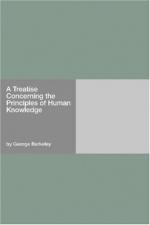34. First general objection.—Answer.—Before we proceed any farther it is necessary we spend some time in answering objections which may probably be made against the principles we have hitherto laid down. In doing of which, if I seem too prolix to those of quick apprehensions, I hope it may be pardoned, since all men do not equally apprehend things of this nature, and I am willing to be understood by every one.
First, then, it will be objected that by the foregoing principles all that is real and substantial in nature is banished out of the world, and instead thereof a chimerical scheme of ideas takes place. All things that exist, exist only in the mind, that is, they are purely notional. What therefore becomes of the sun, moon and stars? What must we think of houses, rivers, mountains, trees, stones; nay, even of our own bodies? Are all these but so many chimeras and illusions on the fancy? To all which, and whatever else of the same sort may be objected, I answer, that by the principles premised we are not deprived of any one thing in nature. Whatever we see, feel, hear, or anywise conceive or understand remains as secure as ever, and is as real as ever. There is a rerum natura, and the distinction between realities and chimeras retains its full force. This is evident from sect. 29, 30, and 33, where we have shown what is meant by real things in opposition to chimeras or ideas of our own framing; but then they both equally exist in the mind, and in that sense they are alike ideas.
35. The existence of matter, as understood by philosophers, denied.[Vide sect. lxxxiv.]—I do not argue against the existence of any one thing that we can apprehend either by sense or reflexion. That the things I see with my eyes and touch with my hands do exist, really exist, I make not the least question. The only thing whose existence we deny is that which philosophers call matter or corporeal substance. And in doing of this there is no damage done to the rest of mankind, who, I dare say, will never miss it. The Atheist indeed will want the colour of an empty name to support his impiety; and the Philosophers may possibly find they have lost a great handle for trifling and disputation.
36. Readily explained.—If any man thinks this detracts from the existence or reality of things, he is very far from understanding what has been premised in the plainest terms I could think of. Take here an abstract of what has been said:—There are spiritual substances, minds, or human souls, which will or excite ideas in themselves at pleasure; but these are faint, weak, and unsteady in respect of others they perceive by sense—which,




